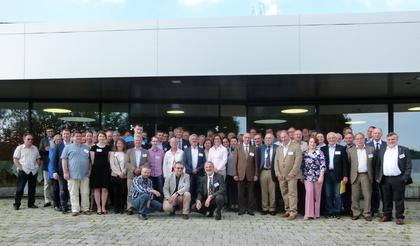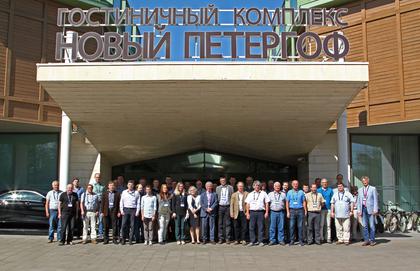Work Package 4
Science Cooperation with the PIK research reactor in the field of neutron sources
Work Package Lead: Alexander Ioffe
a.ioffe@fz-juelich.de
Forschungszentrum Jülich (Germany) / Outstation at MLZ Garching (Germany)
Russian partner: NRC „Kurchatov Institute“ B.P. Konstantinov Petersburg Nuclear Physics Institute, Gatchina (Russia)
Further partners: Helmholtz-Zentrum Geesthacht, Geesthacht (Germany); Technische Universität München, München (Germany); Institute Laue-Langevin, Grenoble (France); European Spallation Souce, Lund (Sweden)
Objectives:
This work package has three main objectives:
- To identify the research interests and needs of EU and Russian partners in the PIK project
- To develop guide lines for a general instrumentation concept for the PIK reactor in cooperation with international partners
- To help in the development of a state-of-the-art supporting structures at the PIK reactor (sample environment and supporting laboratories, user access system, data management and storage, etc.).
Task 4.1 Mapping the needs of the European neutron community
Mapping on demand and in accordance with the needs of the European neutron community for the incoming reactor PIK, with the aim of complementing the existing European neutron research infrastructure and integrating the international user facility PIK into the European neutron landscape in an efficient way.
The PIK project is in a good progress and a flagship infrastructure project in Russia. It is broadly supported by the Russian government; a very positive prognosis on its capability is made by the European expert group. Start in the “full power” modus is expected in 2018, so that the development of user and instrumentation program should be realized in 2018-2020 allowing for regular operations since 2020. Russian partners see PIK as a part of the European Neutron Strategy and are interested to shape the PIK´s position within the neutron rectangle PIK-ESS-ILL-MLZ. The successful integration of PIK as well as synchronisation of its timelines and operation schedules with ILL and ESS promises a significant upgrade of the European neutron landscape and more flexibility for Russian and European neutron communities.
Therefore, continuation of such integration and identification of possible gaps between Russian and European neutron facilities will be the central issue of this task. The realization of pan-European synergies will be ensured through the establishment of working expert groups consisting of the recognized international experts. The recommendations resulted from the discussions should become the guidelines for joint neutron policy.
Task 4.2 Instrumentation Concept for PIK reactor
The scope of the task is the development of guidelines for a general instrumentation concept for the PIK reactor including instruments, neutron delivery system and moderator development activities essentially on the networking, coordination and design study level, also taking in considerations the former contribution of partners to PIK (e.g. HZG delivered 8 instruments to Gatchina).
This will be realised by the organization of 6 joint sub-committees dealing with both instrumentation and scientific aspects of the PIK, as neutron diffractometers, neutron spectrometers, small angle neutron scattering machines and neutron reflectometers as well as research in the field of fundamental physics:
- Reflectometry (FZJ, PNPI, HZG, ILL, ESS, JINR (invited))
- SANS (FZJ, PNPI, HZG, TUM, ILL, ESS)
- Spectrometry (FZJ, PNPI, TUM, ILL, ESS)
- Diffractometry (FZJ, PNPI, HZG, ILL,TUM, ESS)
- Fundamental Physics (PNPI, ILL, TUM, JINR (invited))
- Supporting structures (sample environment, electronics service, laboratory support, etc.) (FZJ, PNPI, HZG, ILL,TUM, ESS)
The sub-committees will take a careful look at and give recommendations:
- International standing and quality of supposed instrumentation concept
- Cutting-edge and pioneering aspects of the instruments to be built and their relevance for a neutron community
- Potential to achieve internationally competitive scientific results
- Perspective to build an outstanding instrumentation concept for a large reactor
Task 4.3 Education and Training Programme
The Education and Training Programme for young researchers in Russia and the EU is to provide education in the design of neutron instrumentation by means of workshops, schools and training courses both in Russia and the EU targeting narrow areas that are very important for the development of the PIK instrumental concept - methods of instrument design and modern simulation methods. These subjects are not really covered by any of the existing neutron schools or courses, however these knowledge is absolutely essential for a general education of Russian scientists that should develop neutron scattering instruments for PIK. Certainly, a general education in neutron physics will be also kept in sight, so that the existing well-established neutron schools and courses will be contacted. This task will be done in close cooperation to the corresponding WP8 measures.
In this respect the sources such as the calendar of the “neutronsources.org” web page (http://neutronsources.org/calendar.html) and the data base of all major schools supported by NMI3 (http://nmi3.eu/about-nmi3/education/list-of-schools.html) are the most effective reference tools.
Task 4.4 Data management
Development of a common data management policy in order to ensure harmonization between both Russian and European neutron communities. The best practice on data policy from the former FP7 projects should be taken in consideration and a platform for any new activities in this respect (e.g. the FP7 project Pandata-ODI and the forthcoming H2020 PANDAAS proposal) will be built in close cooperation with the horizontal exchange platform in WP2.
Task 4.5 User System
Analysis the best practice of European neutron facilities aiming at establishing the PIK as a state-of-the-art international neutron user centre. Experience gained by European partners during many decades of the operation in the user mode and the best practice and the significant progress achieved towards "Harmonised User access" in the FP7 project NMI3 will be used.
Role of the participants of this WP:
Juelich and PNPI will coordinate the work package. All partners are responsible for the implementation of the work package`s goals and expecting to bring their input and in–kind contribution to the tasks by means of networking, staff exchange and organization of the events. It should be noted that a relatively small budget for the WP4 will be mostly used for travel support of Russian and Western scientists for the participation in the working meetings, workshops, schools and training courses to be organized within the scope of the WP, as well as in established neutron schools/courses when such participation is necessary for the purpose of training of the personal involved in the realization of the tasks of the WP.






